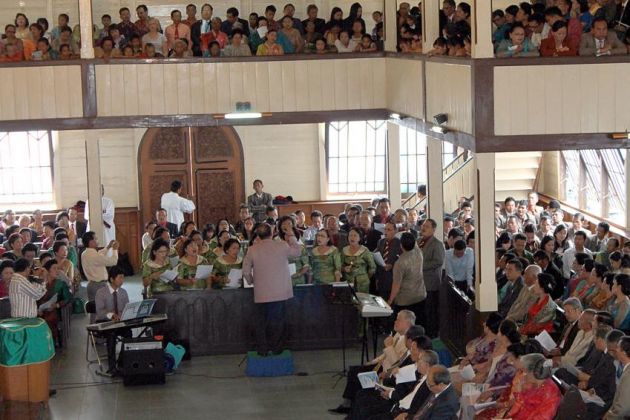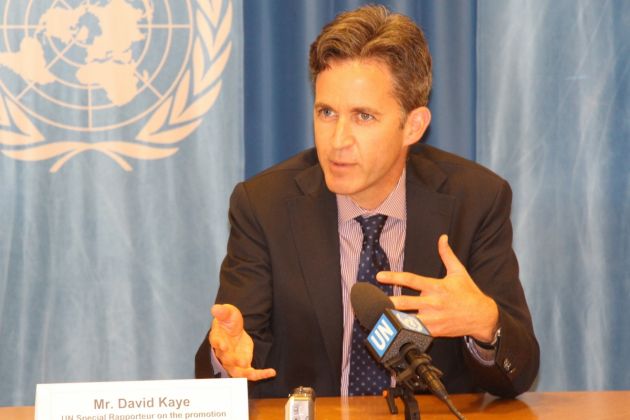Blasphemy law has no place in a 'tolerant nation' like Indonesia, say UN experts

A group of United Nations human rights experts has urged Indonesia's government to repeal its criminalization of blasphemy while the Lutheran World Federation has expressed concern at the politicization of religion in the Southeast Asian nation.
At its 10-16 May assembly in Windhoek Namibia, the LWF issued a public statement on the recent sentencing of the former governor of Indonesia's capital city Jakarta, under the country's blasphemy law.
Basuki Tjahaja Purnama, known as Ahok, who is a Christian in the mainly Islamic nation, had been sentenced to a two-year term of imprisonment by the North Jakarta District Court with reference to Indonesia's blasphemy law.
The statement especially criticized the "mass mobilization of an unprecedented scale, which made it difficult for the judicial process to be impartial and free of political interests," and urged the Indonesian judiciary "to maintain its independence."
The assembly of the LWF, the highest governing body of the Lutheran body urged Indonesian authorities to "review the blasphemy law," ensuring that constitutional rights are guaranteed to all citizens irrespective of their religious affiliation.
It "appeals to citizens to uphold the Indonesian principle of 'pancasila,' which has guaranteed a society in which 'people of diverse religions, ethnic groups and cultures live together' for the benefit of all.
Purnama was officially charged with "blasphemy" on Nov. 17, 2016 in relation to a Qur'anic verse he quoted during his gubernatorial election campaign.
Recent targets of the blasphemy law in Indonesia included three former leaders of the Gafatar religious community noted U.N. the Special Rapporteurs on freedom of religion or belief, Ahmed Shaheed, and on freedom of opinion and expression, David Kaye; and the Independent Expert on the promotion of a democratic and equitable international order, Alfred de Zayas.
PENALIZING BLASPHEMY
"Criminal laws that penalize blasphemy represent an unlawful restriction on freedom of expression, and disproportionately target persons belonging to religious minorities or traditional religions, non-believers and political dissidents," said the experts in a May 22 statement.
"We urge the Government to overturn Mr. Purnama's sentence on appeal or to extend to him whatever form of clemency may be available under Indonesian law so that he may be released from prison immediately," the experts emphasized.
Indonesia's government initiated the prosecution of Purnama following the pressure of a fatwa issued by the Indonesian Ulema Council (MUI), as well as aggressive media campaigns and sometimes violent protests launched against him.
"It is disappointing," the U.N. experts noted, "instead of speaking out against hate speech by the leaders of the protests, the Indonesian authorities appear to have appeased incitement to religious intolerance and discrimination."
They said, "This case also illustrates that the existence of blasphemy law can be used to justify intolerance and hate speech. Blasphemy law is not compatible with a democratic society like Indonesia and it harms religious pluralism in the country."
The experts said Purnama's blasphemy conviction and imprisonment "will undermine freedom of religion or belief and freedom of speech in Indonesia."
For its part the LWF, which holds an assembly every six or seven years, said the churches in the 74-million strong body express "deep concern about the developments in Indonesia leading up to the court sentence."
The Lutheran statement urged the Indonesian judiciary to maintain its independence.
"Instead of reference to a religious judgement of a religious community, this judicial process needs to be based on public regulations, not religious regulations," it said.
It said the Lutheran assembly is joining the many Christians, as well as leaders and people across different religions, "who are deeply worried about the way religion has been politicized in this process.
"This is very detrimental to the goal of people of different religions in Indonesia living side-by-side in peace."
The LWF noted that the Indonesian constitution guarantees freedom of religion or belief in Indonesia and states that every person is free to embrace the religion of their choice.
They are free to worship according to their religion or belief and to choose their education and teaching, even as every person is entitled to freedom of belief and to express their thoughts and opinions in accordance with their conscience.
